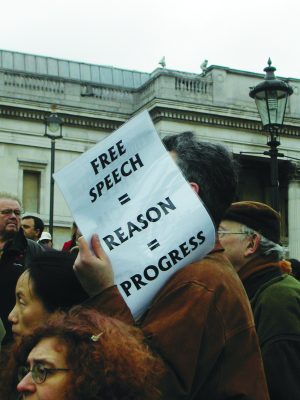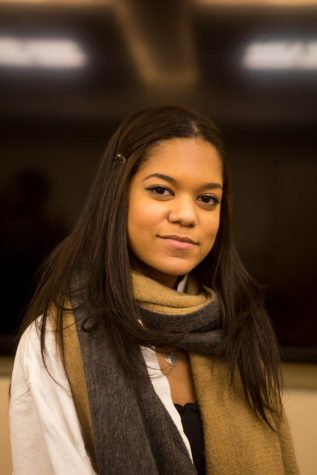Fordham University Ranked in FIRE’s “10 worst colleges for free speech” for Second Year in a Row
COURTESY OF SIMON GIBBS
Following myriad contentious situations, students and faculty question the university’s responsiveness.
February 12, 2018
Fordham University appeared for the second year in a row on the Foundation for Individual Rights in Education (FIRE)’s “10 worst colleges for free speech” list which was posted Monday, Feb. 12 on the foundation’s website.
The foundation noted that their reason including the university on their list this year had much to do with the incident that landed them on their 2017 list: a year-long parley between the administration and the unofficial student organization Students for Justice in Palestine (SJP) after Dean of Students of Fordham College Lincoln Center Keith Eldredge barred their application for club status late Dec. 2016.
Protests followed, the backlash against the decision culminating in an April 26 lawsuit filed by four Fordham students against the university on behalf of SJP. With the litigative assistance of Palestine Legal and the Center of Constitutional Rights, the students faced off against their university on Jan. 3 in the Manhattan Civil Courthouse after the institution filed a claim to dismiss the suit. The court ended up postponing their ruling.
Eldredge declined to comment on this matter.
For these reasons as well as the “shifting array of justifications” that FIRE claimed Fordham presented during the court hearing, the foundation claimed that at least for 2018, the university “continued to stand by its disregard for free association.”
“What’s worse than making this list in 2017?” the subheading for the university begins. “Finding yourself back on it in 2018.”
The University has declined comment on details regarding SJP while it the case is still proceeding, “however,” it noted, “FIRE’s listing misrepresents the state of free expression at Fordham, and frames the issues of free speech and academic freedom in the narrowest possible way. Members of the University community are expected and encouraged to engage in robust, respectful discourse, and do so every day.”
FIRE has also given Fordham University a “Red Light” speech code rating, which by its measure indicates that the “university has at least one policy that both clearly and substantially restricts freedom of speech.” According to the foundation, both Fordham’s Internet Usage Policy, which prohibits “using any IT resource or communication services…to intimidate, insult, embarrass and harass others,” and its Harassment Policy, which is defines sexual harassment “as ‘unwelcome conduct’ of a sexual nature, including but not limited to sexual advances, requests for sexual favors, and other verbal or physical conduct of a sexual nature,” fall under this classification.
FIRE also appealed to the university in a written letter on Jan. 25 calling on the administration to reverse its veto and “reaffirm to students that the university will not renege on its free speech promises.”
Alongside Fordham University stand nine other institutions on that the list claimed have found “dubious ways to silence student and faculty expression” due to their restrictive speech codes. The list itself consists of public institutions, that are bound by the First Amendment, as well as private ones such as Fordham University that are “not required by the Constitution to protect student and faculty speech rights, [but] explicitly promise to do so.”
Fordham’s Mission policy states that the university “strives for excellence in research and teaching and guarantees the freedom of inquiry required by rigorous thinking and the quest for truth.”
FIRE has stated that “90 percent of schools still maintain codes that either clearly restrict or could too easily be used to restrict free speech” despite the slight decrease in the number of universities that had the most restrictive speech codes. Although Fordham University was mainly placed on the list for dismissing the lawsuit filed by SJP, multiple institutions were ranked as the worst colleges for free speech as some “campuses were rocked by violent mob censorship, monitored by bias response teams, plagued by free speech zones, and beset by far too many disinvitation attempts.”
The article also prompts readers to send a digital letter to the university to “HELP DEFEND FREE SPEECH.” As of Feb. 13, the university confirmed it has received two emails.















sex • Apr 14, 2018 at 6:13 pm
What’s up, I read your blogs regularly. Your writing style is witty,
keep doing what you’re doing!